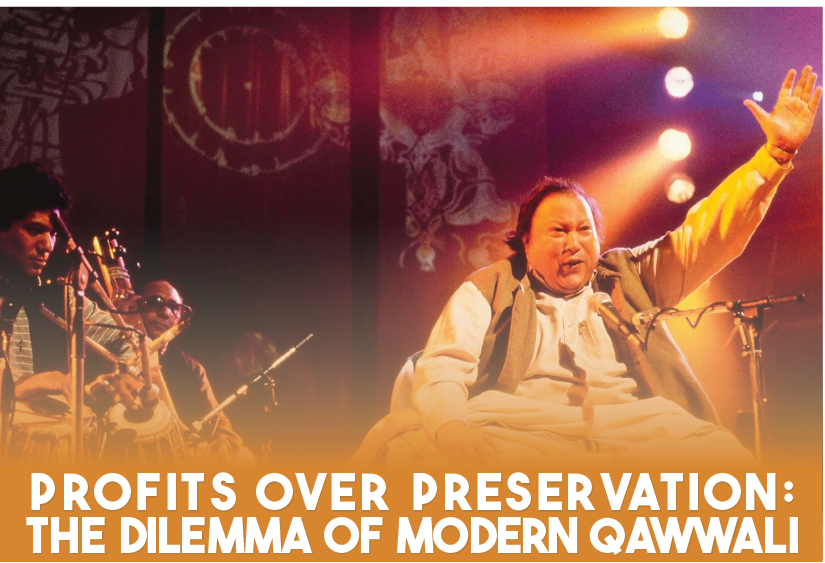
Article by
Qawwali, an integral part of Sufi mysticism, has been an essential aspect of spiritual expression in the Indian subcontinent for centuries. Combining poetry, music, and devotional fervor, Qawwali’s essence lies in its ability to communicate a deep spiritual message through heartfelt melodies and profound verses. Though this art form has endured throughout history, it continues to evolve and adapt to the changing times.
Qawwali is often considered a classical form of music, but it also incorporates elements from folk traditions, classical music, ghazals, thumris, and songs, making it a rich and varied genre. Classical Qawwali is an umbrella that encompasses various forms of poetry and music, including instrumental compositions. The traditional structure of Qawwali, its connection to the Sufi tradition, and its spiritual undertones remain unaltered, but the modern adaptations have brought new dimensions to this genre.
The poetry that forms the backbone of Qawwali is written by renowned Sufi poets like Baba Bulleh Shah, Khawaja Ghulam Farid, Hazrat Amir Khusro, Mian Muhammad Bakhsh, Hazrat Jami, Hafez Shirazi, Hazrat Moinuddin Chishti, Haji Qutubuddin, and Baba Farid. These poets, whose works focus on themes of divine love, brotherhood, and the search for truth, have made Qawwali a medium for spiritual and emotional connection. While the works of these poets, particularly those written in Punjabi and Saraiki, are easy for people to understand, their profound meanings transcend linguistic barriers. It is in the simplicity of these languages that the depth of their spiritual message can be easily conveyed, as opposed to languages like Arabic and Persian, where the essence is often lost in translation.
The primary goal of Qawwali has always been to deliver a message, a mission that remains intact even today. The passion and devotion in the poetry resonate with audiences, regardless of time and place. While the instruments used in Qawwali may have evolved with technological advancements, the fundamental structure and emotional depth of the art form remain unchanged. Good poetry, a skilled voice, knowledgeable listeners, and the right spiritual context are essential for Qawwali to maintain its integrity. If any of these elements are weak, it risks losing its authenticity and becoming something else entirely, far removed from the traditional roots of Qawwali.
Qawwali, as we know it today, was formalized and popularized by Hazrat Amir Khusro. Prior to him, Sufi musical gatherings were called "Sama," focused on facilitating a spiritual connection. Khusro introduced the term "Qawwali" and structured it into the form we recognize today, bringing the poetry of Sufi saints into the courts of Hazrat Nizamuddin Auliya. However, modern Qawwali performances, such as "Qawwali Nights," often focus more on entertainment than spiritual engagement. While this shift helps popularize Qawwali, it risks reducing it to a spectacle rather than maintaining its deep spiritual and cultural significance.
The blend of traditional Qawwali with pop and Western music, seen on platforms like Coke Studio, has made Qawwali popular among younger people. However, using modern instruments and pop beats can sometimes take away from the original spiritual meaning of Qawwali. Despite these changes, Qawwali still holds onto its core values of emotion, spirituality, and connection. Its global popularity continues to grow, with performances attracting audiences worldwide, from South Asia to Europe, the U.S., and the Middle East. Through these performances, Qawwali spreads messages of love, devotion, and spiritual awakening to people from different cultures.
There is a growing trend where younger generations from Qawwali families are turning towards pop music and Bollywood instead of continuing the traditional path of classical Qawwali. While this shift might worry some, it reflects broader changes in culture and the influence of modern media. It’s important to remember that music isn’t passed down through birth, but through learning and practice. Young artists who move away from traditional Qawwali may lose touch with their artistic roots, but if they work on their skills, they can still find success in modern music. The real keepers of Qawwali are those who strive to preserve and understand its deep spiritual message.
In conclusion, while Qawwali has changed over time, it must stay true to its core values of spiritual connection, deep emotion, and meaningful expression. It remains an important part of the Sufi tradition, offering a powerful way to experience love and devotion to the divine. As long as Qawwali keeps its authenticity, it will continue to inspire and enrich listeners, bridging the gap between the past and present, the sacred and the secular. Whether through traditional performances or modern adaptations, Qawwali's lasting legacy will ensure it remains relevant for future generations.
 Monthly "Azeem English Magazine", launched in 2000, records the information about diverse fields like mental health, literature, research, science, and art. The magazine's objective is to impart social, cultural, and literary values to society.
Monthly "Azeem English Magazine", launched in 2000, records the information about diverse fields like mental health, literature, research, science, and art. The magazine's objective is to impart social, cultural, and literary values to society.
+92 51 88 93 092
First Floor, RAS Arcade, Eidhi Market, Street#124, G-13/4, Islamabad, Pakistan, 44000.